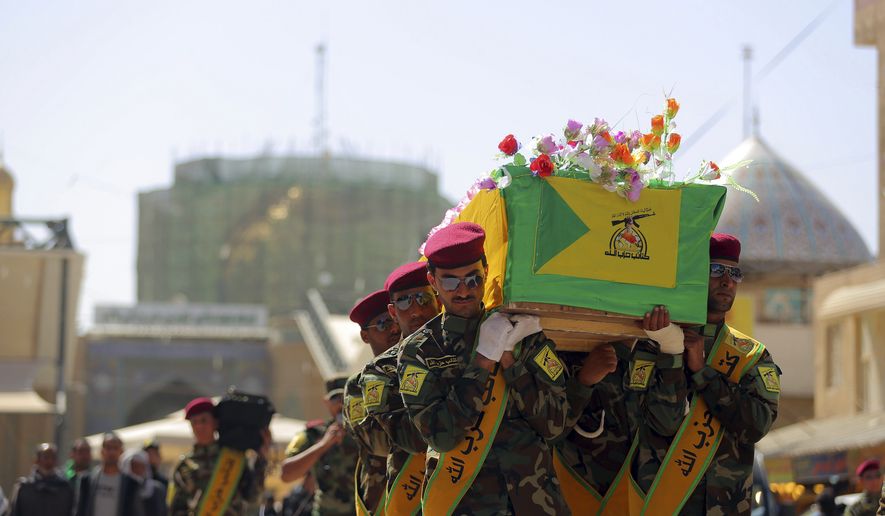The U.S. is not providing airstrikes to help the Iraqi government’s new counteroffensive to again try to take back the Sunni Muslim stronghold of Tikrit from the Islamic State terrorist army.
The American-led coalition has conducted thousands of airstrikes since August to whittle down the Islamic State occupiers, but in this case, it is letting Iraqi aircraft do the bombing.
After at least two failed attempts in recent months to capture Tikrit, Iraq has mustered a much larger force of 25,000. A large number of them are not the regular Iraqi army but Shiite militia fighters who are battling Iraqi Sunni groups loyal to the Islamic State, also called ISIL and ISIS.
Iraq’s largest counteroffensive to date began Monday morning with thrusts from the south and north aimed at retaking Saddam Hussein’s old neighborhood.
Press reports from Baghdad said Iranians were backing up the Shia militias, creating a possible combustible ethnic mix that could break out into sectarian violence instead of a well-orchestrated campaign.
“The Sunnis are torn between holding their nose and siding with ISIS or putting up with Shia militia and Iranian proxies,” said Robert Maginnis, a retired Army officer and military analyst. “Sectarianism is very much alive, and will drive this conflict far more than the political leaders admit.”
SEE ALSO: Americans open to U.S. troops for fighting Islamic State
The government of Iraqi Prime Minister Haider al-Abadi announced the attack with an olive branch to Iraqi Sunnis who joined the Islamic State: Leave the group and win a grant of amnesty.
Navy Cmdr. Elissa Smith, a Pentagon spokeswoman, referred to the battle as “their [Iraq’s] operation.”
“The U.S. has not provided airstrikes in support of the operation,” Cmdr. Smith said. “From my understanding, the Iraqis haven’t asked us to. All of our airstrikes are conducted in coordination with the Iraqis.”
Mr. Maginnis said much of the fighting will be done by Shiite militiamen guided by Iran’s Revolutionary Guard Quds Force, which trained the same types of fighters in how to kill Americans during the 2003-2011 Iraq War.
“The Iraqi Security Forces are unprepared for close-in combat and won’t be [ready] for some time,” Mr. Maginnis said.
Iran’s semi-official Fars news agency reported that Quds force commander Gen. Ghasem Soleimani arrived in Iraq two days ago to coordinate the attack. The Islamic State condemns all Shiites, including Iranians, as apostates or nonbelievers.
SEE ALSO: Mines, bombs slow Iraqi advance on Islamic State-held Tikrit
The large presence of Iranian-backed fighters may be the reason for no U.S. airstrikes since the Americans would, in effect, be providing close air support for Iran.
Home to about 250,000 Iraqis, Tikrit sits 80 miles north of Baghdad and is the capital of Salauhddin province.
The city put up considerable resistance to the U.S. occupation. It was home to a number of al Qaeda in Iraq terrorist cells, out of which sprung the Islamic State.
The Associated Press in Baghdad reported that special U.N. envoy Nickolay Mladenov urged fighters to spare civilians.
“Military operations reinforced by international and Iraqi air support must be conducted with the utmost care to avoid civilian casualties and with full respect for fundamental human rights principles and humanitarian law,” Mr. Mladenov said.
Controlling the city would be a big boost to the six-month-old Shiite-dominated government of Mr. Abadi and possibly provide a launching point to invade the large city of Mosul farther north.
Retired Army Lt. Gen. James Dubik, an analyst at the Institute for the Study of War, said many questions remain: Can Iraq’s government reclaim Tikrit? How does Baghdad plan to hold it? Will any recriminations follow?
On Mr. Abadi’s timing, Mr. Dubik said, the operation may be a chance to increase confidence in the Iraqi Security Forces, test the Islamic State’s defenses and shorten ground supply routes for battle in Mosul.
Mr. Abadi traveled to Samarra on Sunday to address fighters poised to attack.
Samarra is the hometown of Islamic State leader Abu Bakr al-Baghdadi, a cleric who rose in the ranks of al Qaeda in Iraq and then formed the Islamic State in eastern Syria amid the so-called Arab Spring that spawned opposition to Syrian President Bashar Assad.
The Islamic State’s conquests in Iraq began in January 2014, when it invaded the western portion of the country, eventually capturing the city of Fallujah, for which the U.S. expended much blood in 2004 in two major battles.
Six months later, Islamic State terrorists swept out of Syria into northern Iraq, taking Sunni-dominated cities such as Mosul and Tikrit.
The Iraqi Security Forces put up little resistance. Sunni commanders felt little allegiance to the Shiite government of then-Prime Minister Nouri al-Maliki. The U.S. said Mr. al-Maliki ruined the military’s command structure by firing competent generals and alienating Sunni tribal leaders.
• Rowan Scarborough can be reached at rscarborough@washingtontimes.com.




Please read our comment policy before commenting.